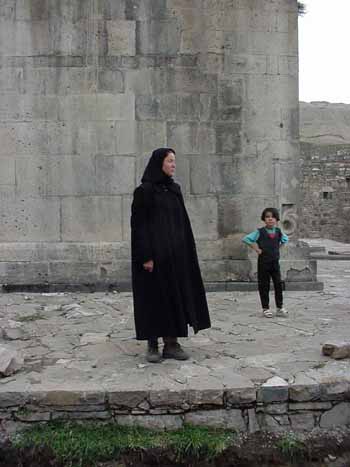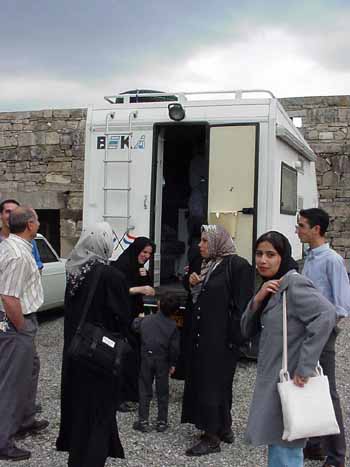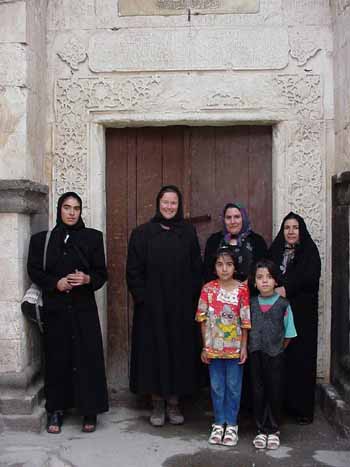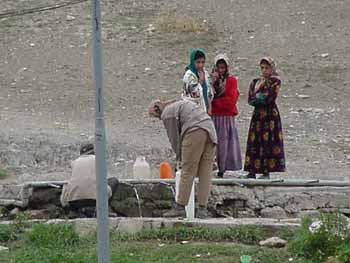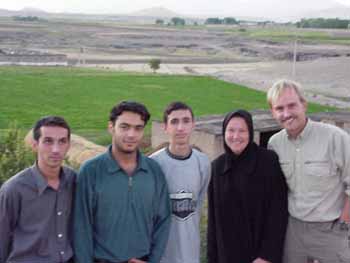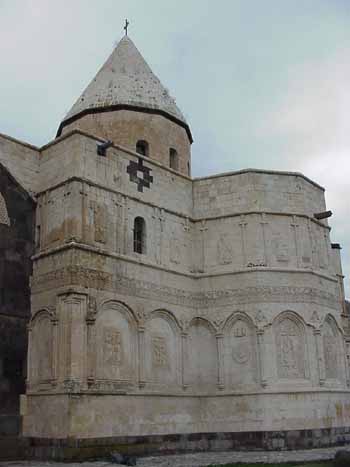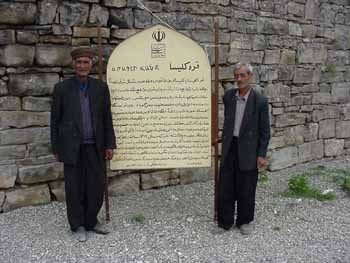|
|
 |
 |
 |
|
The next couple of days we just drove to Dokubayazit as quickly as possible, because our Iranian Visa only had room for one more week in Turkey and we where
very curious how Iran is like.
On the camp-site "Murat Camping" in Dokubayazit near the Iranian border, we met a German couple, biking for 6 weeks in Turkey and a Dutch couple biking their way to
Nepal. The German couple told about a scary experience they had the night before. In the middle of the night while camping out in the wild they where hassled by a couple of men wanting money from them. They pulled
guns at the couple and were threatening them. After some time the couple started to scream which seemed to help to scare the men away quickly. Ofcourse no sleep for the rest of the night but no more men sticking up
guns in their faces.
Anyway, the same could have happened anywhere in Europe too, camping in the wild comes with some risk. But as we agreed with them, staying on a camping does not always reduce that risk.
People with robbery and theft as their occupation will definitely try their luck at tourist places and certainly will not look for the same 'in the wild'.
The "Murat Camping" belongs to two Kurdish
men who sat down with us the whole evening. We listened to their stories about live in Dokubayazit, Iran, living the Kurdish way (as far as that's possible in Turkey) and their import and export business with Iran.
Dirt cheap Iranian Petrol, Persian carpets and satellite TV dishes(illegal in Iran) are some examples of quite profitable trade.
Next to this running a camp-site on the doorstep to Iran sure is some business.
The bigger adventure companies like Djoser, Dragoman and many others all stop at Murat camping for one night before crossing the border with Iran. Celebrating the last beer when going to Iran or the first beer when
coming from Iran. For us that wasn't just one beer :).
The next morning (Sunday, September 10), we drove off to the border, both off us slightly nervous not knowing what to expect. I was wearing my black
"raincoat" and a black scarf, which was pretty hot. I certainly have to get used to this and I can't say I liked it. The border is, as many borders usually are, a very chaotic and an 'eye-sore' kind of
place. Heavily guarded, huge fences, dust, dirt and many shabby buildings with a lot of grim faced people inside.
It took us a while till we figured out where we had to go. There must be some law here which
prohibits any sign-posting of any building.
When we finally found the Custom and Police office Arno went in first. After 15 minutes I followed him, and joined the queue for Turkish passport-control. Arno's
passport was already checked and he had to get some stamps in another office because of exportation of the car out of Turkey. When my passport was checked Arno went back to the car to fetch some more papers. But I
wasn't allowed to go outside anymore and was lead into a big room full of women in black chadors and a few men. The door closed behind me and was locked immediately!!
There I was, in a room full off people
while Arno didn't know were I was and I couldn't get out. Lucky for me, there were three Australians and I asked them if they know what was the meaning of this all and what to do next. They had given their passports
to an Iranian man who was waiting in front of a big iron door, together with a large group of men. I pushed my way to him and gave him my passport. He made clear we had to wait until the door opened and we would be
let into the customs of Iran. So we waited. After 10 minutes the door opened and some guy shouted an Iranian word.
At that moment a large group of women in black chadors started to move towards the door, like a
big black wave, pushing, screaming and shouting their way through. The Iranian man returned my passport and pushed me into this big black wave, and I felt myself floating towards the open door. It was a crazy
experience! I handed my passport over to the man behind the door, but I wasn't allowed to walk any further. Instead I had to wait in a corner while the stream of women in chador pushed through. Suddenly I had to
fill in some form and my passport was again thoroughly checked. I got my passport back and that was it, I was in Iran, but where the hell was Arno!!
I checked a few buildings and the surroundings but
couldn't find him. I felt a slight panic but tried to relax by telling myself that he had to be somewhere. Finally, I saw the car with Arno in it. He was still in Turkey. I waved at him, to let him know that I
already was in Iran.
The exportation of the car was a fuzzy procedure of many stamps, scribbles and checking of documents. Unfortunately this all took place around lunch-time so not every custom official
with the almighty stamps were there. After an hour or so Arno managed to collect all stamps and scribbles making a border crossing into Iran possible. During the whole procedure 3 man swirled around Arno asking to
change money while begging for give-aways like pens, jeans, chocolate. Apparently a part of the reality of crossing borders in the region Turkey-Iran.
Finally, Arno could drive our car across the border to
Iran where we were re-united. A man from the Iranian tourist-office was waiting for us, Mr Hussein. A very polite English speaking Iranian. He explained to us that he could help us through the 'Carnet de passage'
formalities and the custom check. To be honest we were quite happy with his help. I think without him, it would have taken us quite some time to find all the hidden offices for all the vague but very important
stamps and unreadable papers we needed.
And of course, for his help, we were asked to produce a fee. And you'll be surprised to see what wonders some baksheesh can do to speed up and smoothen the bizarre Iranian
importation procedure. The carnet papers where swiftly checked and stamped in 4 separate rooms, each filled with different grim looking people.
When our camper had to be checked the customs officer just pushed
his nose inside looked for 1 second, checked the car chassis number and that was it. We could go, leaving with amazed and stunned faces.
Next we drove through endless chaotic lanes of Iranian trucks into the
even bigger chaos of the city of Bazargan. We where attacked by clouds of aggressive black-market money-changers who offered horrendously bad Rial rates for US dollars. The good rate comes down on 8200 Rials for a
dollar, the money-changers offered rates ranging from 2000 till 7000. But luckily we managed to change 30 US$ for 7000 Rials at the Iranian border post which is a small give-away.
|
 |
 |
|
After all the whole crossing took us only two hours, which was not bad considering that we entered Iran during lunch time.
The speed we took up in the
streets of Bazargan saved us from any more people clamping onto our car. Our next stop was Ghara Kelisa, a beautiful old Christian church, which attracts hundreds of Armenian pilgrims every year around June 19.
It took us about two hours to get there, while getting used to the horrific driving style of the average Iranian driver. Their road-gear equals to the cars we had in the 60's in Europe. The main Iranian car is
the Phekan which comes only in a few models and colours. It does 10 Km on 1 litre of dirt cheap petrol and can take up speeds up to 140-150Km/hour fully packed with people. The petrol is exactly 110 Rials/litre
which comes down on approx. 1 dollar-cent/litre. So a full tank of diesel (120 litres) came down on 1 US$ and 20 whopping cents. The quality of the diesel is superb and our experience is that we even get more Km out
of 1 litre of diesel. The word is that on the Turkish side, the Iranian diesel is mixed with water and sold to petrol stations.
With our model 2000 Nissan pickup truck in Iran we felt like a western car
advertisement set back 30 years in time. This was quite noticeable on streets looking at the open mouths, big eyes and neck breaking stares of people along the road. And not to forget the people in the cars
over-taking us resulting in kamikaze manoeuvres and near accidents behind and in front of us. How will we survive this traffic hell the coming month?
|
 |
 |
|
Janine getting some water, watched by kurdish women FLTR: Hoesein, Alkan, Hoesein's brother, we near mount Ararat
|
 |
 |
 |
 |
 |
 |
 |
 |
 |
 |
 |
 |
 |
 |
 |
 |
|
The next morning, after drinking some tea with the guide of Ghara Kelisa, we drove to Maku to phone the family. And again, when people saw us with our
"strange-looking" car all eyes where pointing at us.
Iranian people normally drive fast, unpredictable and unaware of any other cars around. With us in the vicinity, the driving turned into sheer
kamikaze. Apparently there is no need to watch the road anymore, we are there to look at.
After the call, two sons of the family picked us up and we were heading to their home. Because their parents weren't
home yet and their sister was in the house, they had to ask permission from their father to let us in. After some phone-calls we could enter their house.
Beautiful carpets everywhere, in the bedrooms no
beds, they sleep at the floor on cushions. Some renaissance style chairs, covered with satin-sheets to protect them from dust. The living room is practically an open space with all furniture stacked against the
walls. This set-up allows maximum space for eating, which is ofcourse on the floor.
After a while, the parents came home and we had some wonderful, though difficult conversations using dictionaries and a bit
English and Farsi. I was allowed to put of my scarf and "raincoat" but strangely the women kept their chadors on.
It soon became clear to us that live in Iran is hard, although much has changed the
past years. As a small example, two years ago it wasn't allowed to play music tapes in the car, now every-one has a music cassette player in the car. FM music stations however are still non-existent. As we noticed
rather quickly that people, specially the young, are afraid for the police and specially the Mula's.
A Mula keeps an eye on the community that all religious rules are lived by correctly. If not, a Mula has the
authority to instruct the police to jail any offender.
For boys and girls it is impossible to meet, they can only talk to each other on the phone and meet secretly in cars after sun-set. Dancing and singing
(especially for women) is not allowed in public, only at private parties in home (on weddings and that kind of special events).
Immediately I felt ashamed that I had problems with wearing my
"raincoat". For me it was just a minor discomfort which would only last a couple of weeks.
|
|
|
|
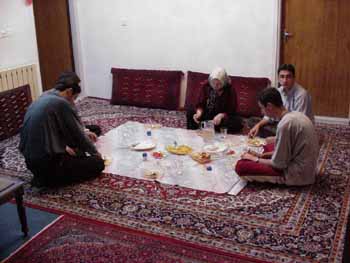 |
|
|
|
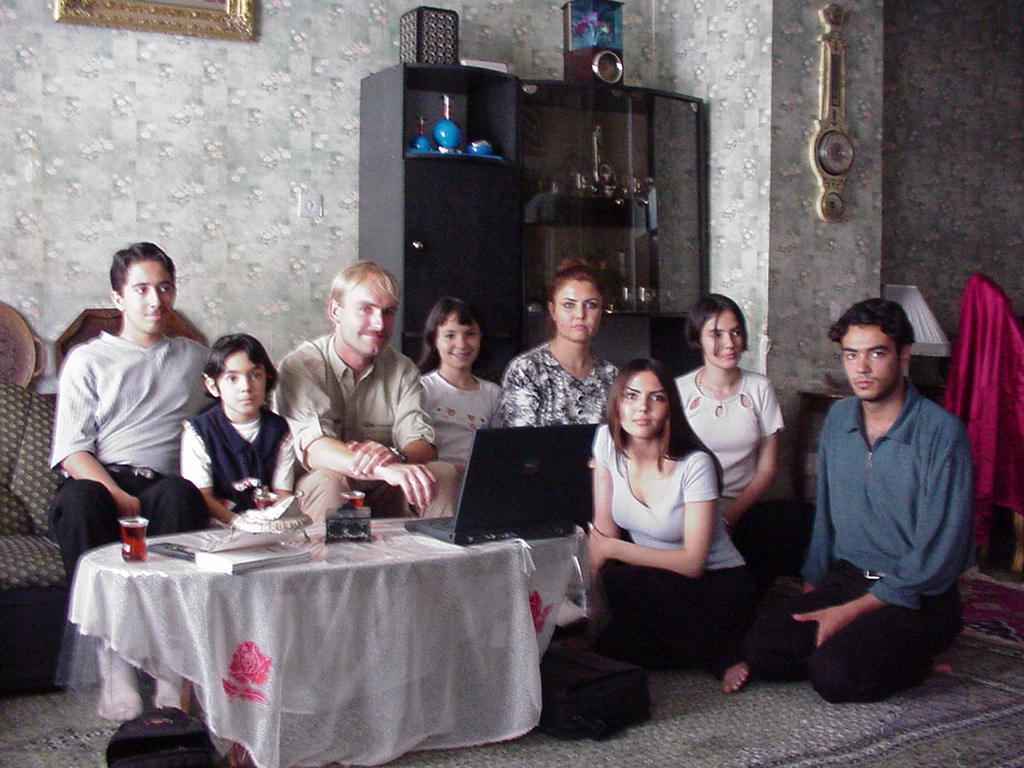 |
|
|
|
Eating at Hoesein's family Alkan's family (click for large!)
|
|
|
|
Unfortunately, Arno got ill that evening and couldn't join dinner. I think maybe the stress of crossing the border and driving in this horrendous traffic
showed it's effect on his body.
After dinner we had to move the car to a private car-park of a friend of the family, because our car simply attracts too much attention and therefore it wasn't save to leave it in
the streets. At that point we couldn't quite imagine what that meant for the rest of our trip in Iran.
The next day (Tuesday, September 12) was an exciting, but very, very tiring day. Originally we planned to
leave because we wanted to go to Tabriz. But the friend and his family and also an uncle of his invited us in their homes. So we had to spent our day in three different houses. All these families were so incredibly
kind, showing a warm kind of hospitality unknown in the Netherlands. We had a lot of fun, we showed each other pictures etc. etc. We were overwhelmed by all this kindness. Finally, at 1am we rolled into our beds,
completely exhausted.
|
|
|
|
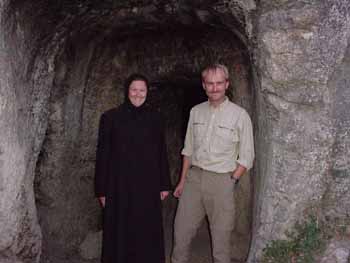 |
|
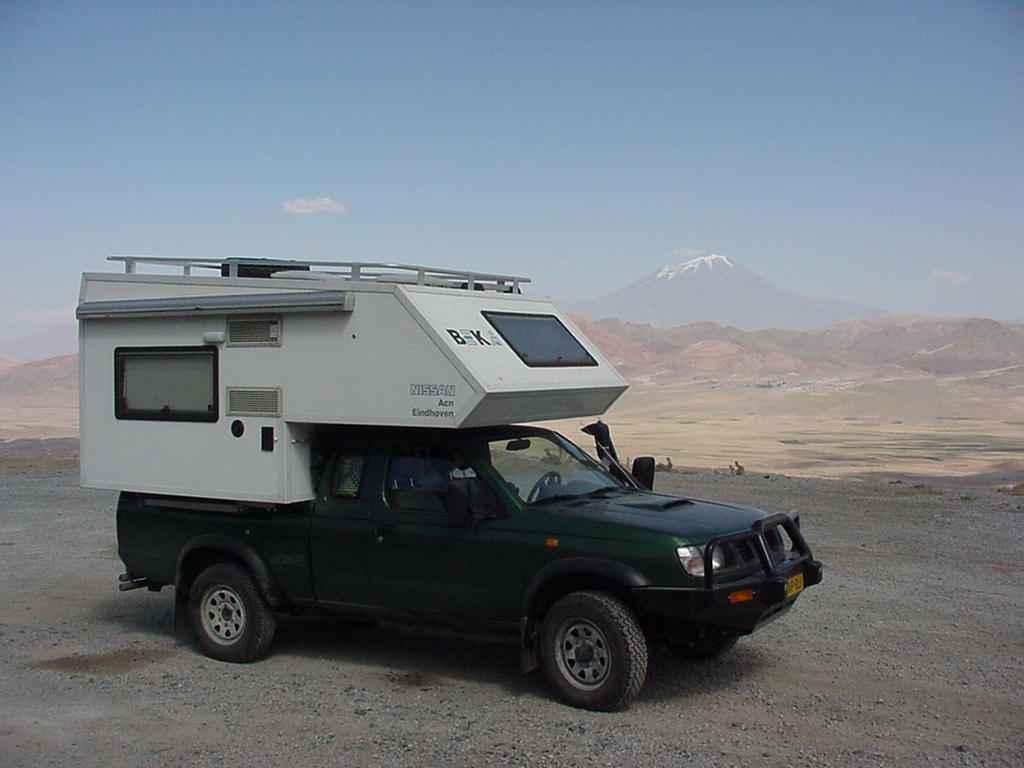 |
|
|
We at an ancient cave at Maku Posing in front of mount Ararat (click for large!)
|
|
|
Wednesday, we headed for Tabriz. According to Mr Hussein, there should be a camp-site somewhere in the city (which is rare in Iran). Again, we were a big
attraction on the road and Arno could barely avoid accidents because some crazy Iranian drivers thought we were more important to look at than the road. But that wasn't all. Whenever we stopped or had to drive
slowly, people were clinging on to us, to our car etc. to ask for baksheesh, to ask where we come from, where we were going, if we were married, if we had children, if we had pencils etc. or just to touch our car.
During the trip to Tabriz we ran into multiple road blocks from customs, police and Army officials. Grim faces suspiciously looking at our car but surprisingly we where waved through quite often. All bigger
cities we've seen have checkpoints on all roads checking the traffic. Iranian cars where checked thoroughly and it seemed to us that the average Iranian has more to fear from these roadblocks than we.
Next
to the road blocks we've seen 4 really bad car crashes in one day. In 3 cases a car completely wrecked by a big truck. On our whole tour through Turkey we've only seen one car accident. The car crash statistics in
Iran do not seem to be exaggerated a bit.
We were prepared for a lot of things but the suffocating and quite dangerous attention we got on the road wasn't quite what we expected. Turkey felt like heaven to us
compared to Iran, although Turkish people still notice us on the road but allow a bit of air between their and our car.
Finally, at 7 pm we arrived completely wasted at the camp-site. We spend nearly two
hours looking for the unsigned camp-site asking around in the chaotic traffic melt down of Tabriz, the 3rd biggest city in Iran.
The camp-site is on the road to Teheran and can be seen on the left side from the
4 lane road. We've got the GPS location coordinates for anyone interested.
We hoped to get a bit of rest here, but again bad luck. When we tried to eat our dinner, people were exploring our camper as if it
was on an exhibition. Even a blind man was exploring it with his stick, scaring the hell out of us by banging on the bodywork of our car. Anyway it seemed that he just lost his way of the pavement and Arno lead him
back.
After a quick look Arno concluded that the camp-site was a part of a luna-park where young Iranians come to meet and court. No wonder there was so much traffic around our camper on the camp-site. Next to
this it was also the start of the weekend. (Wednesday evening)
Anyway all this was just a bit too much for me and I just had to vomit a few times from stress and exhaustion. At 10pm we decided that staying
here wasn't a good idea, because we couldn't get any rest at all. The crowd was just starting to grow meaning no sleep at all for the coming hours.
So we drove into Tabriz in the dark, looking for a hotel. An
intensely bad idea, but well at that moment we felt we had no choice. Trying to find a hotel in very, very, very busy Tabriz, in the dark is looking for some serious trouble! So, after an hour we just headed back to
the camp-site and parked our car at a somewhat more quiet spot, which was actually the parking place near the campsite.
We woke up very early, after a restless night. I was still sick so we decided to go to
Tabriz once again to find a quiet hotel with a private parking place. Unfortunately we couldn't find any with a parking place with an entrance high enough for a camper. Parking in the street is simply no option for
us because of the crowds our camper draws.
We were both so exhausted of the constant attention that we decided to head back to Ghara Kelisa, where we knew we could find some rest, at least during the night.
Again, a trip where people in cars were following us, causing near-accidents and intense chaos on the road. A game we frequently encountered was being over-taken than slowing down (even stopping) to let us pass and
again overtaking us. As we guessed this was simply a way to look at our car from all sides, but each time we where at the brink on an accident. After 5 exhausting hours this trip ended while we arrived at Ghara
Kelisa.
|
|
|
|
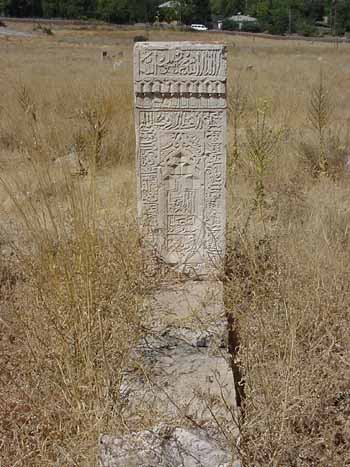 |
|
|
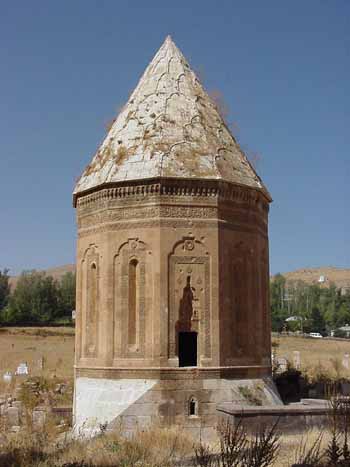 |
|
|
|
|
|
|
Armenian memorial church Armenian grave site
|
|
|
We spend another day at Ghare Kelisa, just to get some rest during the night. During the day, we still were the main attraction of people visiting the church.
In fact the young people basically ran out of their cars to look at our camper and ask us the usual stream of questions.
We really can imagine their longing for any news or information coming from the
western world. As we noticed their view on the western world comes from Turkish TV stations received using illegal satellite receivers. Seeing us with our camper is just a good chance to known how things really are
in the western world.
All day and the day before we did a lot of soul-searching, thinking over what we encountered the past days. We were prepared for a lot of things, but we were not prepared for the huge
amount of (kamikaze) attention we attract with our car. This attention almost causes accidents on the road in front of us. With some fair amount of luck we can survive all the hassle and attention during the day, if
we could have some peace at night, but so far that seems impossible.
Looking for Hotels with private parking takes a huge amount of our time, camping alongside the road (gas stations) simply draws to much
traffic again, and camp-sites like the one in Tabriz are extremely rare.
In fact Iranian people are extremely mobile, petrol is dirt cheap and cars are not that expensive too. This in combination with the way
young boys and girls try to meet, cruising in the their cars in the evening and night (to avoid to be seen by mula's), the chance they see our camper parked somewhere is quite big.
We wanted to see Iran and
all her wonderful sites and we wanted to meet the people, but exploring this country with our eye-catching camper feels impossible without having an accident. It would be a lot easier if we had a normal car or
motor-cycle which can be parked in the streets without attracting large crowds.
So, after two days of thinking, discussing, weighing all the possibilities, we finally decided, with pain in our hearts, to head
back for Turkey again.
But we made a promise to ourselves, we will come back, but with backpacks or a less eye-catching car. The decision was hard, but we still think best for us. When Iran opens up it might be
easier for us to travel this way, new cars will be a normal sight and young people might be able to court in the open during day-time.
So on Saturday 16 September, after 7 days, 950 Km and 15 hours behind the
wheel we headed back to Bazargan to go through customs into Turkey. This time it took a whopping 5 hours to make the crossing due to the weekend in Turkey and a huge flood of Iranian people coming back. Next to this
Sunday is a big day for the Iranian customs since president Khatami will come over to open a new custom office, looking even better than the ones at the Turkish border.
Murat and his brother (a Sean Connery
look alike) welcomed us with a deep smile and a large beer, the first in a week. It tasted very well, but we still didn't felt happy we had to leave Iran. Now we have to decide what route we're going to travel. But
first a couple of days of relaxing and give the "Iran-experience" the change to settle down a bit.
|
|
|
|
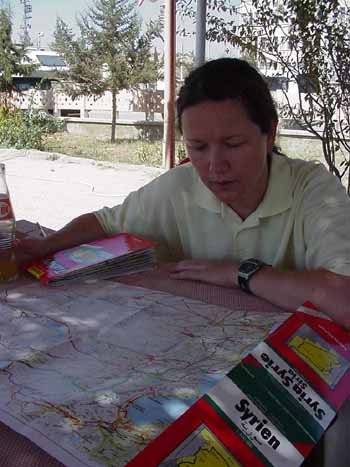 |
|
|
|
Janine planning for Syria in the blazing heat at Harran
|
|
|
|
We decided to go to Syria first and after that, well, it all depends on how we feel and what information we get from other people. Maybe it's possible to get
a tourist visa to Saudi-Arabia? Who knows. We heard that the government started to issue a few of them this year.
The next couple of days we slowly drove to the border of Syria through
Dokubayazit-Edremit-Dyabarkir-Harran. In Edremit we met a Dutch pilgrim, Thijs Postma, who is walking his way to India. He started his remarkable journey in 1998 and walked from Amsterdam to Jerusalem. His goal is
to get people be aware of the wonderful nature we live in and the things we do to destroy it. After a short holiday he is now walking to India. A very remarkable man. His story is on the web:
http://listen.to/pilgrims and home.wxs.nl/~nijen006/voetreis1.htm
|
|
|



